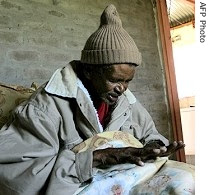| Abidjan 12 November 2007 |
 Download
DownloadAn official spokesman for Ivorian President Laurent Gbagbo has said the president believes political leaders from across the spectrum must work together in order to guarantee lasting peace in the country. The comment follows a recent visit by U.S. Deputy Secretary of State John Negroponte, who says much of his time in Ivory Coast was spent encouraging authorities to work transparently and collectively to implement a March peace accord. Phillip Wellman reports for VOA from Abidjan.
Presidential spokesman Gervais Coulibaly says Mr. Gbagbo agrees with ambassador Negroponte that the best way to implement Ivory Coast's peace accord is by collaborating with the opposition on important issues.
 |
| Ivorian President Laurent Gbagbo, right, greets U.S. Deputy Secretary of State John Negroponte in Abidjan, 11 Nov 2007 |
Negroponte met government and opposition leaders, U.N. officials and representatives from civil society during his visit to evaluate progress towards unity. Negroponte is the most senior U.S. official to visit Ivory Coast since the beginning of civil war in 2002, which divided the country into a government-controlled south and a rebel-held north.
The peace accord signed between President Gbagbo and rebel leader Guillaume Soro in March, resulted in a coalition government in which Soro became prime minister. The aim of the agreement is to guarantee free and fair presidential elections.
The accord is widely believed to be Ivory Coast's best chance at reconciliation, but concerns over the pace of implementation have led some international observers, including U.N. secretary general Ban Ki-Moon, to express serious concern.
Speaking to journalists on Sunday, Mr. Negroponte said the United States would like to see full implementation of the peace accord happen as soon as possible. He says that some progress has been made since March, but more should continue.
"Implementation will require courage and a willingness to move beyond the disagreements that have kept Cote d'Ivoire divided," he said. "In my meetings today, I urged Ivorian leaders from across the spectrum to take the steps they know are necessary to implement the agreement and to work together to improve Cote d'Ivoire's prospects for the future."
Negroponte says following through with the agreement will be a complex task, but says it must be done to improve Ivory Coast's social and economic prospects.
"The road ahead will be a difficult one - but it is not an impossible one," he noted. "There will be difficult choices that only Ivorians can make and I encouraged your leaders today to address these issues in as open a manner as possible so all points of view are heard."
Identification of undocumented Ivorians, reintegration of rebels into the national army and disarmament are issues that Ivory Coast has yet to fully deal with. Mr. Gbagbo says he is trying to solve the country's problems thoroughly and together with the opposition, but critics say the president is stalling reconciliation procedures to remain in power. Mr. Gbagbo denies the accusations.
A coalition of opposition political parties in Ivory Coast says it is currently trying without any success to work with Mr. Gbagbo to make sure presidential elections are held before April 2008.
Negroponte says he believes there is a strong desire on the part of all parties to move towards unity.
Ivory Coast was Negroponte's first stop on a West African tour that will also take him to Nigeria, Burkina Faso and Mali.







